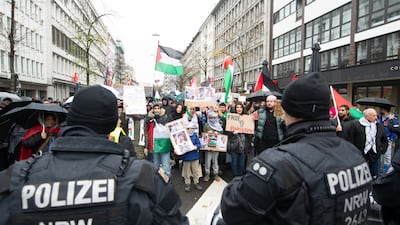Live updates: Follow the latest on Israel-Gaza
Udi Raz was fired by Berlin’s Jewish Museum for using the word “apartheid” as she described Israel’s occupation of the West Bank on guided tours.
Her sacking came at a sensitive time as the Israel-Gaza war awoke deep-rooted fears of anti-Semitism in Germany.
But as an Israeli Jew from Haifa who says the museum was eager for authentic Jewish voices, she considered herself an unlikely victim of the crackdown.
“You can imagine how surprised I was,” she told The National.
Germany’s sensitive anti-Semitism radar is the result of the Holocaust and its post-1945 credo of “never again”.
Jewish fears were proved justified when the Star of David was daubed on buildings and explosives thrown at a synagogue after the war erupted on October 7.
But pro-Palestinian activists say Germany’s anti-Semitism net is cast too wide, quelling valid criticism of Israel.
German police cut the power and shut down a conference of pro-Palestinian activists on Friday after a banned speaker appeared by video link, organisers said.
Syrian-German journalist
The three-day Palestine Congress, promoted by pro-Palestinian groups including former Greek finance minister Yanis Varoufakis's DIEM25 party, said it aimed to raise awareness of what it called Israel's "genocide" in Gaza.
The police banned the final two days of the event, citing concern about the potential for hate speech.
Among the speakers was activist Salman Abu Sitta, author of a January essay that expressed understanding for the Hamas militants who on October 7 raided Israel.
"A speaker was projected who was subject to a ban on political activity," Berlin police said on social media.
"There is a risk of a speaker being put on screen who in the past made anti-Semitic and violence-glorifying remarks. The gathering was ended and banned on Saturday and Sunday."
Organisers of the conference said police intervened when Mr Abu Sitta, who according to Stern magazine was banned from entering Germany, began speaking on video.
"The police violence, like we were some sort of criminals, was unbearable for a democratic country," said Karin de Rigo, a parliamentary candidate for the German offshoot of DIEM25.
"They not only stormed the stage, they cut the power like we were transmitting violence."
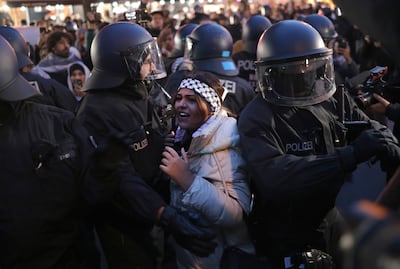
The congress itself faced calls for a ban, with Germany’s main Jewish council predicting it will “spread anti-Semitic hate”.
A letter from MPs opposing the conference warned it would play down the violence of October 7 and builds ties between Hamas sympathisers.
Ms Raz was due to speak at the event, representing a group called Jewish Voice for Just Peace in the Middle East.
It had an account suspended by a Berlin bank which asked for names and addresses of members, an act it alleges was politically motivated.
Ms Raz said Jews who self-identify as secular and do not feel represented by the pro-Israel central council are “being left outside”.
“We are marked as a problem not only for the nation of Germany but also for Jewishness itself. We are more often than not being called self-hating Jews, anti-Semites, Israel-haters and so on.”
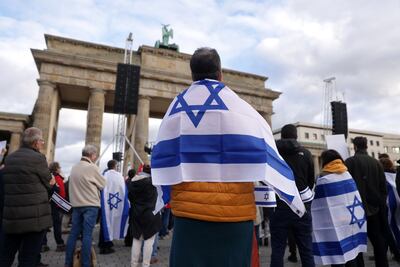
Clashes on campus
Universities are another battleground.
Nancy Fraser, a Jewish academic, had a professorship revoked by the University of Cologne because she called for a boycott of Israel.
Amid an outcry, the university said Ms Fraser was not banned from lecturing but was no longer eligible for a “special honour”.
Dozens of academics have signed an open letter warning that an effort to exclude anti-Israel voices “seems to be accelerating”.
In Berlin, laws have been tightened after an attack on a Jewish student, Lahav Shapira, at the city’s Free University.
Universities are being handed the power to expel students as part of the crackdown on anti-Semitism.
“A resilient democracy must defend itself, including at universities,” said a group of Jewish students supporting the change.
One pro-Palestinian student campaigning against the new law said it was too vague and could punish people for activism off campus.
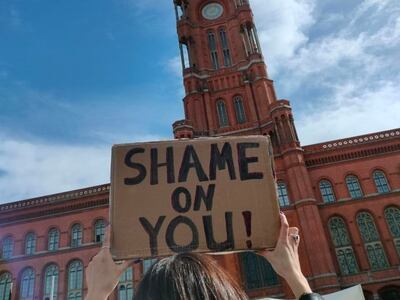
A climate of “fearmongering” meant any criticism of Israel could be labelled as anti-Semitic, said the student, Ahmed A.
“With the history of Germany this can be a very dangerous label, which can cost you your job, your status in society and other areas where you’re active,” he said.
He told The National the new law made universities a “court on your behaviour” and would not improve safety.
“If you expel someone, the person still has the ability to come on campus. The campuses are not fortresses with high walls,” he said.
“So it doesn’t make sense to make such a vague law that you can just expel anyone because, quote unquote, they are extremist.”
Activists have set up a so-called “archive of silence” that documents cases of anti-Israel voices being “cancelled”.
Syrian-German journalist Helen Fares was sacked by a TV network for “extreme political positions”, notably calling for a boycott of Israeli products with the help of an app called No Thanks.
“None of us should be scared of speaking our truths. If this is the consequence, then that’s OK. It’s not OK for democracy, but it’s OK for me personally,” she said.
Another row erupted at a film festival where artists accused Israel of genocide, with government officials branding it “unacceptable” that this was not balanced with a mention of Hamas violence.

A common complaint is that Germany has got its historical responsibility all wrong by focusing on the debt it owes Israel.
Germany’s stance might be “understandable and laudable” if it were focused on Jewish people, the International Court of Justice heard this week.
But “the Israeli state, and particularly its present government, should not be confused and equated with the Jewish people,” lawyer Alain Pellet told the court on behalf of Nicaragua.
As a second point, Germany is accused of forgetting how the expulsion of Palestinians was an aftershock of the Holocaust.
When activists call on Germany to live up to international law this weekend, Ms Raz said, they will refer to “the same international law that has been designed as an outcome of the atrocities committed against the Jewish population of Germany – among which my grandparents were subjected to it as well”.
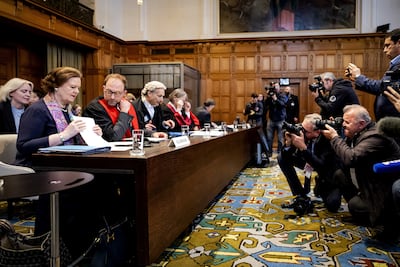
Mood shifting
As in the US and Britain, there has been a shift in Germany’s official tone towards Israel.
In the days after October 7, Chancellor Olaf Scholz lauded Israel as a democracy like Germany that would act with restraint in Gaza.
Ministers moved to ban any Hamas presence in Germany and shut down a pro-Palestinian group called Samidoun.
But in recent weeks they have increasingly sounded alarms about the civilian toll of the conflict.
Ahmed, the pro-Palestinian student, said there were signs German people share concerns about Israel’s conduct.
“Slowly, the mood in the whole of society, since the tone has shifted, has been somewhat better than previously,” he said.
Activists scored a win last month when judges in Frankfurt lifted a ban on the slogan “from the river to the sea, Palestine will be free”.
There could be “various means and ways to achieve this abstract goal” and it does not necessarily imply violence against Israel, a court ruled.
On the day the congress begins as a “safe space” for anti-Israel activists, opposition MPs are pushing for laws that would “close gaps” in punishing anti-Semitic incitement.
The row over this weekend’s congress suggests neither side is backing down.
